Environment Justice Matters Vol. 4 Issue 05: ESG Turns 25!

Vol 4. Issue 05
ESG turns 25!
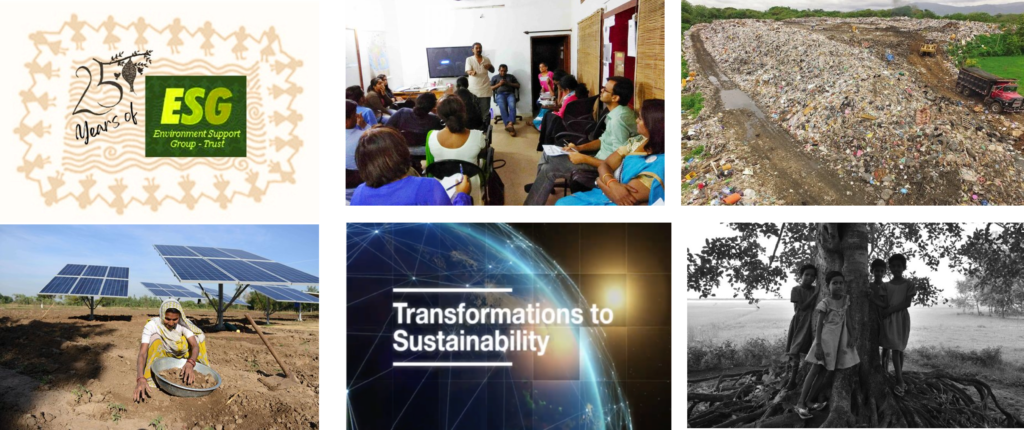
This month ESG officially turns 25. If we travel back in time to our formative years, and from that time perch view ESG of today, the feeling is rewarding. We feel happy to have consistently worked advancing environmental and social justice concerns through all the challenges the quarter century offered us. We also feel grateful for the help, support and solidarity we have received from hundreds of individuals and organisations across India and the world, which energised us to do more.
At a time when space for civil society organisations is shrinking, even confronted out of existence, working with communities at risk and in need of critical support for building imaginaries of a better and just world is a difficult choice. This choice is made easier with the support we have received from academia, various officers of the State and the pathbreaking decisions in response to our public interest litigations from the Judiciary. Media support has helped navigate complex terrains advancing and securing human rights and environmental and social justice.
To commemorate ESG’s work over the past 25 years, we have organised a major event at Infosys Science Foundation, Bangalore on Thursday, 27th April. Please mark your calendars and please come, if you are in Bangalore, or join online from wherever you are. We will share details about this soon.
Besides, we will be organising a series of public engagements across India on the criticality of making environmental justice central to our decision making. Through this news digest, our website and social media handles will keep you posted.
We will be honouring our long term partners from local communities who have walked this walk with us, whilst also developing new interventions to extend support to newer communities at risk and in more regions across India.

We will also be intensifying our efforts working with local and regional governments, as well legal services authorities and regulatory institutions countrywide, in advocating and advancing environmental justice. Similarly, we will develop new research and academic programmes and build new collaborations to deepen understanding of environmental and social justice necessary to address climate change and its wide ranging impacts.
All this needs your continued support and monetary contributions. We hope to raise Rs. 2.5 crores (Rs. 25 million) in the coming year to make all these possible. We are counting on your support! Click here for more details.
To know more about the lessons we learnt from the 25-year journey of ESG, Citizen Matters engaged in an exciting conversation with Leo Saldanha and Bhargavi Rao which can be viewed here.
Webinar: Right to Clean Environment
As part of commemorating ESG’s 25 years of service to public causes and advancing environmental and social justice, a series of webinars are being held to explore meaningful, inclusive, durable and sustainable solutions to tackle air pollution.
Leading experts, senior officers from government agencies and regulatory institutions, and key representatives of major international initiatives working to make the world better for all, are participating in this webinar process.
The first webinar on Role of Science, Public Health and Governance in Tackling Air Pollution was held on the occasion of International Women’s Day, March 8th and the report is accessible here.
The next webinar in the series is on Right to Clean Environment, during which we will take a closer look at the implications of the 22nd July 2022 UN General Assembly resolution making “the right to a clean, healthy and sustainable environment as a human right” while noting that “the right to a clean, healthy and sustainable environment is related to other rights and existing international law”.
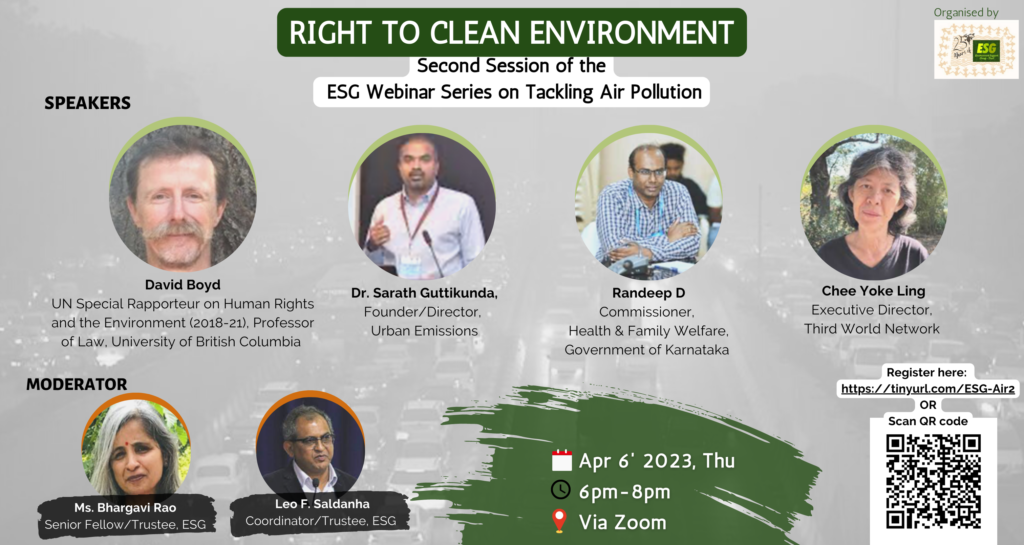
Adivasi Rights under Attack
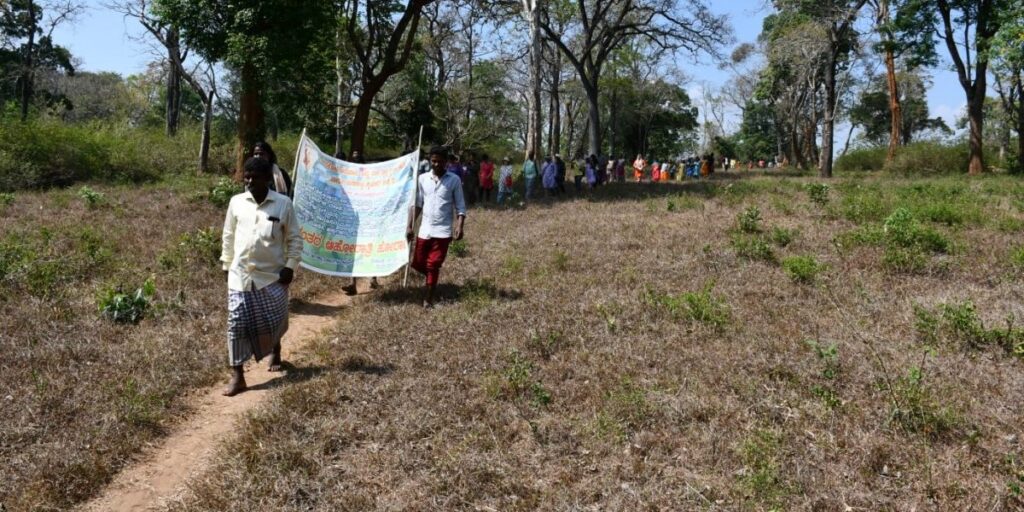
Adivasis continue to suffer attacks on their fundamental rights due to lack of enforcement of the historic Forest Rights Act (FRA), 2006. To challenge this impasse, Adivasis of Nagarahole joined forces with other forest dwellers and organised a foot rally between March 15 and 21 with the intent of making their demands heard.
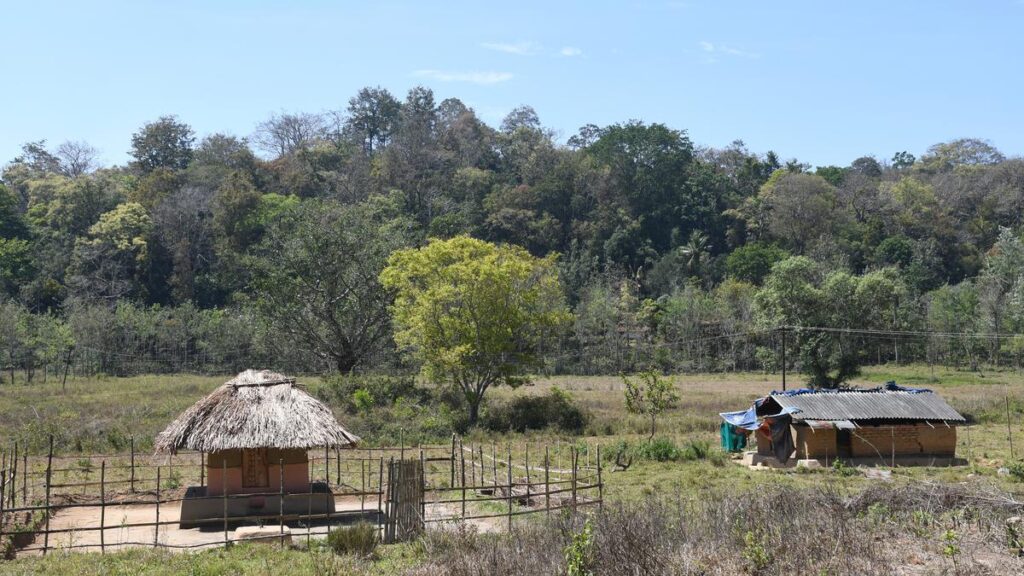
Meanwhile in Tamil Nadu, many Adivasi families are bitter about the agreement between the Forest Department and nearly 700 families forced to relocate out of Mudumalai Tiger Reserve based on false promises. They believe their ties with the forest are stronger than other communities who obtained a High Court (HC) order for relocation. Problematically, a judge of the Madras High Court has also held that persons claiming rights under the Act need to establish sole dependency upon forests for bonafide livelihood and cannot be merely granted rights because their ancestors originally resided in the forests, in variance to the promise of the Act.
Such dislocation and disengagement of adivasis from their natural habitats is resulting in a major public health crisis, as has been noted with Soligas of BR Hills in Southern Karnataka. Adivasis in Telangana are battling coal mining which is expanding illegally after already destroying several of their villages and forests, and the combination of major violations is now being directly addressed by the National Green Tribunal.
Climate Change Updates and Policy Developments
The UN General Assembly adopted a landmark resolution on March 29th. This will help establish a legal litmus test of sorts for the global climate justice movement seeking to hold countries to account for climate failures in the courts.
While this new legal development might help hold polluting countries to account, a new study worryingly reveals increased flushing of freshwater into the ocean due to glacial melt is disrupting the flow of the Antarctic overturning circulation, which is responsible for shifting heat, oxygen and nutrients around the globe, and this could potentially lock nutrients in the deeper ocean thus destroying marine life massively,
In India, a study by Indian Council of Agricultural Research (ICAR) and the Central Marine Fisheries Research Institute (CMFRI) finds that the carbon footprint of the fisheries in India is 16.3% lower than that of the global level.
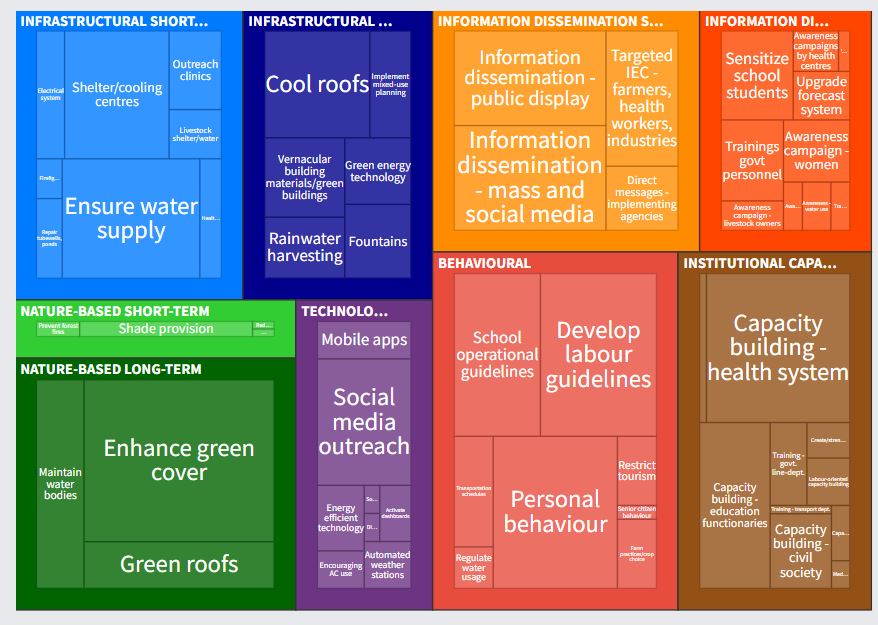
Heatwaves in Argentina usually expected due to the La Nina have prolonged and intensified this year owing to climate change, finds a study. This has affected the harvest crops of soybean, corn and wheat.
A new report entitled ‘How is India Adapting to Heatwaves? assessing 37 Heat Action Plans (HAPs) across 18 states, identifies several opportunities to strengthen Indian HAPs and documents an encouragingly wide range of solutions,
A recently released report by the Cross Dependency Initiative (XDI)—the Platform, ranking over 2,600 jurisdictions around the world lists 14 Indian states among the top 100 most climate-risk-prone territories in the world in 2050 based on modelled projections of damage to the environment from extreme weather and climate change. Climate economist Nicholas Stern, in 2019, stated that “Climate change could lead to the greatest market failure ever.” warning it is high time regulators accepted economy is a subsidiary of ecology. Economist Sebastian Dettmers who observes global population growth is slowing, while a positive thing, could create a new problem: a dramatic crippling of our global economy.
The Assessment Report on the Diverse Values and Valuation of Nature, which was approved by the IPBES Plenary at its 9th session in July 2022 (IPBES-9), provides guidance to policymakers for navigating the intertwined economic, social and environmental dimensions of sustainable development in a balanced manner.
Environmental Degradation and Pollution
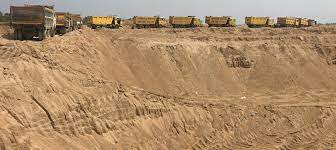
The scale of environmental degradation has not slowed down despite wide ranging news of climate change induced impacts. In Udupi Taluk of coastal Karnataka, about truckloads of sand is being illegally mined from riverbeds even though this risks the stability of the Konkan Railway. In the neighbouring Baikampady Industrial Area in Mangalore, industrialisation and reckless pollution has destroyed rivers and ground water aquifers, and is also contaminating the sea..
Such degradation is evident across India. Yet, the Supreme Court is inclined to relax restrictions within 1km Eco-Sensitive Zone of protected areas and wildlife sanctuaries, where currently permanent structures and mining activities are strictly prohibited according to its June 3rd, 2022 order. This even as inaction against illegal resorts and homestays which fall within 10 kilometres of the eco-sensitive zone of Kali Tiger Reserve in Uttara Kannada is posing a serious threat.
Conservation with People’s Participation Works
In Chihuahua, Mexico, a river-based resistance group called Vida en el Río San Pedro (VRSP), not only collects trash from the San Pedro river to keep it clean, but documents biodiversity: a method that exposes the destruction caused by pollution. Check out how their digital storytelling is helping the cause.
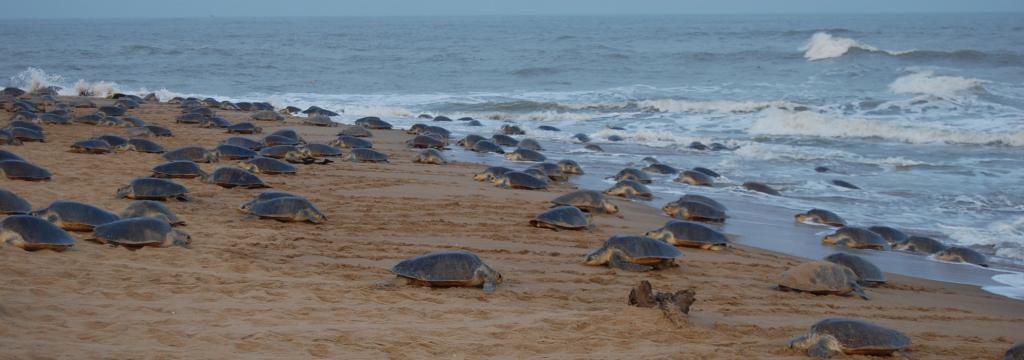
This year in Gahirmatha, Odisha, Olive Ridley turtles making their way from the Bay of Bengal laid nearly 5.12 lakhs eggs during mass nesting (arribada) and this increase over the years depicts the success of the conservation work of decades. The Odisha government has also declared 18,963.898 hectare of Gandhamardan Hill Range in Bargarh and Balangir district as a Biodiversity Heritage Site (BHS), three decades after a highly successful people’s resistance against bauxite mining there.
One of the cheetahs brought from Africa, for reintroduction in India, died due to renal failure. This when Senior Advocate Prashanto Chandra Sen has alleged that the Environment Ministry appointed task force does not have a single member with expertise in cheetah management. There are now growing concerns regarding the cheetah introducation project in India.
In Madhya Pradesh’s Kanha Tiger Reserve, a study reported that two invasive species, Lantana camara and Pogostemon benghalensis, co-occurring has caused a “significant decline in the richness of native plants and that of palatable plants”, which might eventually affect herbivores and then top predators.
Environmental Jurisprudence in Action

The SC has directed MOEFCC to respond to a petition to protect 1,29,037 sq. km of the Western Ghats filed by a minor from Nilgiris. A key demand is the implementation of Madhav Gadgil-headed Western Ghats Ecology Expert Panel’s Report as a means of securing the future of today’s children.
In a major development, NGT stayed Environmental Clearance (EC) granted to two power plants in Tamil Nadu. In Odisha, NGT suspended the environmental clearance granted to the mega steel project proposed by Sajjan Jindal-led JSW Group, stating a number of aspects which could prove detrimental to the surrounding environment. Forest, wildlife, coastal & environmental clearances are being rushed at a frenetic pace and this is destroying environmental regulatory systems in India. Over 12,000 environment clearances were granted in 2022, 20 times more than 2018.
On March 29th, the Centre introduced the Forest (Conservation) Amendment Bill, 2023 in the Lok Sabha, which is said to be the most devastating dilution in forest protection laws in decades, leading to loss of large tracts of forests without necessary clearances. Former Indian Environment Minister and Chairman of the Parliamentary Standing Committee on Environment has also protested the Bill being controversially sent to a Joint Parliamentary Committee stacked with MPs from the ruling BJP.
Biodiversity Amendment Bill, 2022 was also introduced in Parliament when chaotic scenes ensued with the Opposition demanding accountability on the Adani scandal. Fundamental amendments are proposed through this amendment, introducing concepts such as “codified traditional knowledge”, and entirely without any meaningful public discussion or debates in legislatures and Parliament. It appears that dilutions to environmental laws in India is not a concern to the Indian Environment Ministry.
In light of such disturbing changes, Environmental Law and Policy in India: Cases and Materials, by Shyam Divan and Armin Rosencranz throws light on the significant erosion of environmental justice in India.
Distributed Renewable energy: The way forward?

While it is widely being acknowledged that large scale solar projects cause more harm than good, in Karnataka’s Kundapur district, erratic power supply from grid electricity networks led to many traditional businesses switching to decentralised solar energy. Solar power generation capacity in India had reached nearly 62 GW by November 2022 and it is targeted to install 500 GW of RE by 2030. But this brings up new challenges:. a large amount of solar photovoltaic waste in future and no strategy on how to handle it.
The EU wants to make solar power its single biggest source of energy by 2030 which requires trebling generation capacity. In an attempt to be self-reliant and reduce dependency on China, which currently dominates the solar production at all stages of the solar supply chain, the commission has decided to introduce a Net Zero Industry Act designed to boost the manufacture of “strategic” technologies, including solar and other renewable energy infrastructure locally.
Disastrous Urban and Infrastructure Expansion
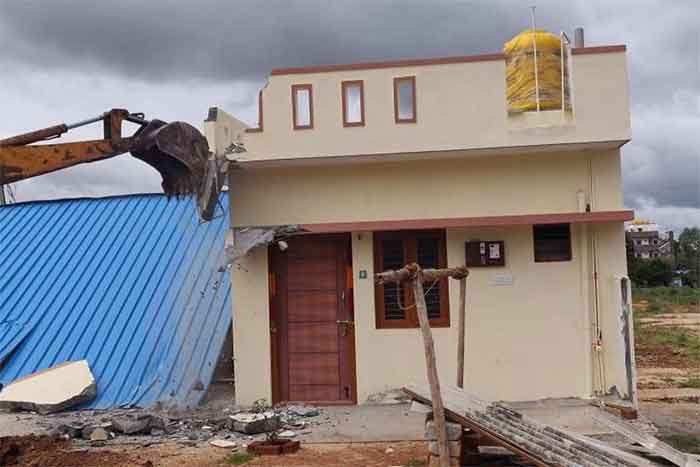
The gross injustices in development of Shivarama Karanth (SK) Layout north of Bangalore has been focused in the previous issue of Environmental Justice Matters. Subsequently, over 2500 people have urged Chief Minister of Karnataka to protect farmers, pastoralists and Dalits from this supreme injustice. Bangalore Development Authority (BDA) in response has claimed impacted communities, will receive developed land as compensation for the farms and livelihoods they have lost. The farmers have rejected this proposal.
Meanwhile, Upa Lokayukta has initiated suo moto proceedings against BDA in response to DH Reports that electrical contracts for the Layout were awarded flouting all norms.
While it is entirely unclear what constitutes a ‘green highway’, given that highways cause more pollution and environmental destruction, World Bank has agreed to fund ‘green national highways corridor project’, This includes 781 km of highways in Himachal Pradesh, Rajasthan, Uttar Pradesh and Andhra Pradesh. Successive central and state governments have blindly embraced such promotion of financial-economic growth as the path of development instead of focusing on empowering people, promoting health and welfare, minimising inequality, and securing livelihoods.
In this context, an interesting video of Oakland (US) made by Segregation by Design highlights how roads came up by displacing households and segregating neighbourhoods so that people would have no choice but to use vehicles to commute.
Large stretches of the Bengaluru-Mysuru Expressway flooded with just one night of heavy rainfall, and merely a week after Prime Minister Narendra Modi inaugurated the project. Built at a cost of Rs 8,480 crore, the project has left commuters and villagers seething with rage, as Union Government and State officials find someone to blame. Over 90 lives have already been lost due to the rushed opening of this yet incomplete project. The heavy toll has commuters seething with rage. Villagers have blockaded the project multiple times already demanding they must have access to it as there are simply no safe cross over points for them
Cultivating Good Water, Conserving Water Commons

The first United Nations Water Conference organised in 50 years highlights that the world is facing a serious water crisis. The Freshwater Challenge, announced at the conference aims to restore 300,000km of rivers – equivalent to more than 7 times around the Earth – and 350 million hectares of wetlands – an area larger than India – by 2030.
In Bangalore, the fight to protect Cubbon Park has seen many twists and turns. Recently, Revenue Minister R Ashoka signed off on a 184-acre park near Yelahanka, referring to it as “the second Cubbon Park”. and their livestock.
The reasons why Bengaluru continues to be vulnerable to floods are lack of collective and effecting imagination to make the city functional for all the city, say Leo Saldanha while Bhargavi Rao of ESG. While Malini Ranganathan (a professor at American University, Washington DC) examines the political economy of storm water drains and how it defeats progressive urbanisms.

The Karnataka State Pollution Control Board (KSPCB) has fined an apartment in Kumbena Agrahara village for constructing several structures falling within the buffer zone of a nala and “blocking the stream”. On the other hand, in spite of the HC orders to stop lake encroachments, 300 truckloads of soil has been dumped by BBMP in the Hosakerehalli lake, bisecting the water body to form a road to an apartment in blatant disregard for law and judicial directives.
A short film on Neeruganti (a water manager) by Foundation for Ecological Services draws attention to the criticality of ground up governance of water commons.
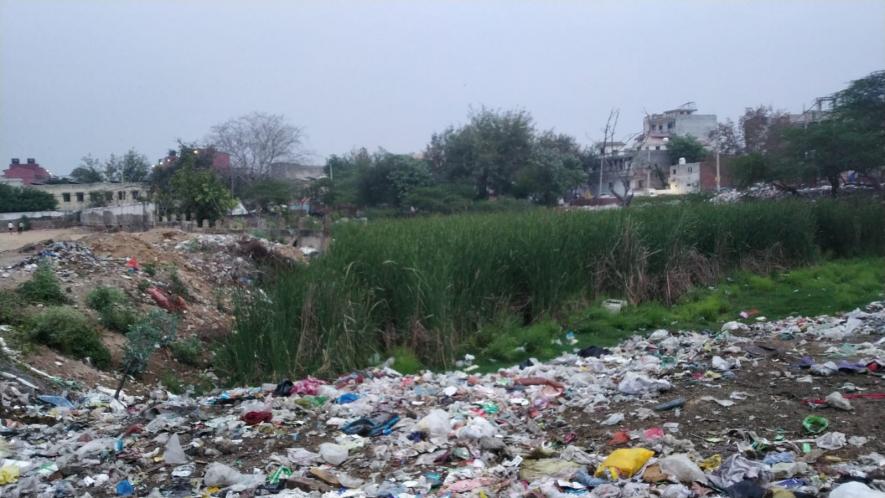
In Delhi, villagers of Budela and Asola are facing lack of basic amenities such as water due to disappearance of local water bodies, especially because of waste dumping and encroachments. Across the country in Kerala, the Environment Committee of the Kerala Legislative Assembly has come up with a series of recommendations including monitoring water quality, coliform bacteria level and waste dumping in Ashtamudi Lake, to protect it from further pollution. Meanwhile, MOEFCC has established that Gujarat has the highest number of highly polluted river stretches (PRS) in India.
[This edition of Environment Justice Matters was compiled and presented by Amrita Menon]
Environment Support Group (Trust)
1572, 36th Cross, Ring Road , Banashankari II Stage
Bangalore 560070. INDIA
Tel: 91-80-26713560 | Voice/Fax: 91-80-26713316
Website: esgindia.org Email: [email protected]
Follow our Facebook, Instagram, Linkedin and Twitter page
- ESG is registered to secure support under the Corporate Social Responsibility (CSR) scheme of the Ministry of Corporate Affairs. Reg No. -CSR00017320
- Environment Support Group (ESG) is eligible to receive foreign donations/grants per the Foreign Contribution Regulation Act (FCRA)
- All donations to ESG from Indians are eligible for tax exemptions as per Sec. 80G of the Income Tax Act.
More details about ESG’s Financial Reports and Statutory Approvals are accessible here: https://esgindia.org/new/financials-and-statutory-clearances/
Your Monetary Contributions Keep Us Working

Donate Via UPI
(This QR Code is applicable ONLY to Indian/Domestic donors. Post UPI payment, please share donation details to [email protected] along with PAN – statutory requirement.)

